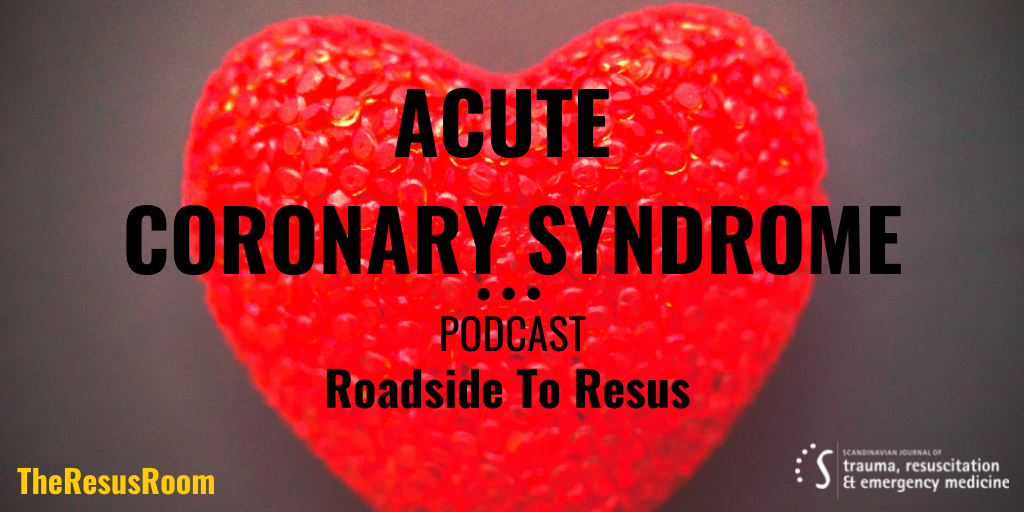So this time we’re going to be looking at the HUGE topic of acute coronary syndrome (ACS)! ACS ranges from patients who appear well at the time of their presentation, to those that have arrhythmias, haemodynamic instability, to those that are in cardiac arrest!
There are around three quarters of a million ED chest pain attendances per year for acute chest pain and it accounts for around 25% of ED medical admissions!!
Some of the treatments we’ll discuss for patients with ACS can have a huge affect on morbidity and mortality and we can make a real difference to our patients. The ESC guidelines are a fantastic resource to take a look at and we’ve listen the papers that form the evidence we cover in the podcast.
We worry about missing ACS and conversely, with so many ‘suspected ACS patients’, we also worry about overly suspecting it and the subsequent burden of admissions and investigations that it may mean. We’re going to cover the approach to ACS in this episode in our standard format, all the way from definition, patho-physiology, assessment, investigations and management and cover aspects that are both new information and a sound revision of the topic.
Once again we’d love to hear any thoughts or feedback either on the website or via twitter @TheResusRoom.
Enjoy!
Simon, Rob & James
Now that you have listened to the podcast, start the quiz to add it to your CPD Diary
References
NICE. Acute Coronary Syndrome Guidelines 2020
2020 Acute Coronary Syndromes (ACS) in Patients Presenting without Persistent ST-Segment Elevation (Management of) Guidelines
TheNNT; Aspirin Given Immediately for a Major Heart Attack (STEMI)
The NNT; Thrombolytics for Major Heart Attack
The contemporary significance of Framingham risk factors. Barbra E Backus. Eur J Emerg Med. 2021
Do risk factors for chronic coronary heart disease help diagnose acute myocardial infarction in the Emergency Department? Richard Body. Resuscitation. 2008
The role of cardiac risk factor burden in diagnosing acute coronary syndromes in the emergency department setting. Jin H Han. Ann Emerg Med. 2007
LITLF; MI localisation
The NNT; Acute Coronary Syndrome
Does This Patient With Chest Pain Have Acute Coronary Syndrome?: The Rational Clinical Examination Systematic Review. Alexander C Fanaroff. JAMA. 2015
Evaluation of the impact of the GRACE risk score on the management and outcome of patients hospitalised with non-ST elevation acute coronary syndrome in the UK: protocol of the UKGRIS cluster-randomised registry-based trial. Colin C Everett. BMJ Open. 2019
Does a strict glycemic control during acute coronary syndrome play a cardioprotective effect? Pathophysiology and clinical evidence. Alfredo Caturano. Diabetes Res Clin Pract. 2021
Impact of call-to-balloon time on 30-day mortality in contemporary practice. Richard W Varcoe. Heart. 2017
Pre-hospital thrombolysis delivered by paramedics is associated with reduced time delay and mortality in ambulance-transported real-life patients with ST-elevation myocardial infarction. Erik Björklund. Eur Heart J. 2006
Randomised trial of intravenous streptokinase, oral aspirin, both, or neither among 17,187 cases of suspected acute myocardial infarction: ISIS-2. Lancet. 1988
2020 ESC Guidelines for the management of acute coronary syndromes in patients presenting without persistent ST-segment elevation: The Task Force for the management of acute coronary syndromes in patients presenting without persistent ST-segment elevation of the European Society of Cardiology (ESC). Jean-Philippe Collet. EHJ. 2020
2017 ESC Guidelines for the management of acute myocardial infarction in patients presenting with ST-segment elevation: The Task Force for the management of acute myocardial infarction in patients presenting with ST-segment elevation of the European Society of Cardiology (ESC). Borja Ibanez. EHJ. 2017
P2Y12 platelet inhibition in clinical practice. Peter Damman. J Thromb Thrombolysis. 2012
Role of beta blockers following percutaneous coronary intervention for acute coronary syndrome. Peck. Heart. 2021
PRe-hospital Evaluation of Sensitive TrOponin (PRESTO) Study: multicentre prospective diagnostic accuracy study protocol. Abdulrhman Alghamdi. BMJ Open. 2019
Diagnostic Performance of Prehospital Point-of-Care Troponin Tests to Rule Out Acute Myocardial Infarction: A Systematic Review. Abdulrhman Alghamdi. Prehosp Disaster Med. 2020
St. Emlyns; Troponins
RCEMLearning; Acute Coronary Syndromes


